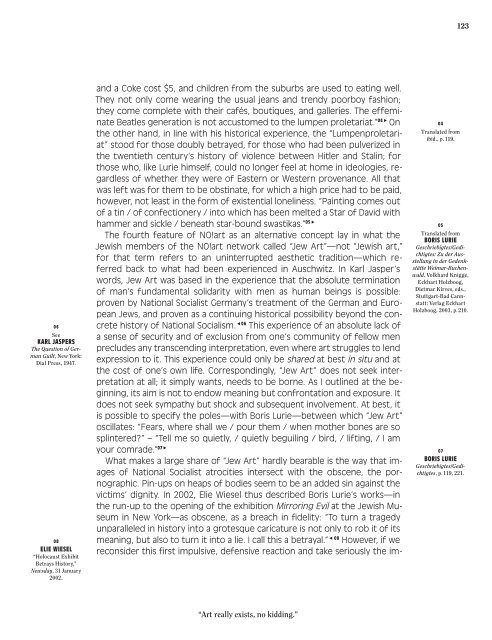The Art of
Katalog_Boris-Lurie_English
Katalog_Boris-Lurie_English
You also want an ePaper? Increase the reach of your titles
YUMPU automatically turns print PDFs into web optimized ePapers that Google loves.
123<br />
06<br />
See<br />
KARL JASPERS<br />
<strong>The</strong> Question <strong>of</strong> German<br />
Guilt, New York:<br />
Dial Press, 1947.<br />
08<br />
ELIE WIESEL<br />
“Holocaust Exhibit<br />
Betrays History,”<br />
Newsday, 31 January<br />
2002.<br />
and a Coke cost $5, and children from the suburbs are used to eating well.<br />
<strong>The</strong>y not only come wearing the usual jeans and trendy poorboy fashion;<br />
they come complete with their cafés, boutiques, and galleries. <strong>The</strong> effeminate<br />
Beatles generation is not accustomed to the lumpen proletariat.” 04 On<br />
the other hand, in line with his historical experience, the “Lumpenproletariat”<br />
stood for those doubly betrayed, for those who had been pulverized in<br />
the twentieth century’s history <strong>of</strong> violence between Hitler and Stalin; for<br />
those who, like Lurie himself, could no longer feel at home in ideologies, regardless<br />
<strong>of</strong> whether they were <strong>of</strong> Eastern or Western provenance. All that<br />
was left was for them to be obstinate, for which a high price had to be paid,<br />
however, not least in the form <strong>of</strong> existential loneliness. “Painting comes out<br />
<strong>of</strong> a tin / <strong>of</strong> confectionery / into which has been melted a Star <strong>of</strong> David with<br />
hammer and sickle / beneath star-bound swastikas.” 05<br />
<strong>The</strong> fourth feature <strong>of</strong> NO!art as an alternative concept lay in what the<br />
Jewish members <strong>of</strong> the NO!art network called “Jew <strong>Art</strong>”—not “Jewish art,”<br />
for that term refers to an uninterrupted aesthetic tradition—which referred<br />
back to what had been experienced in Auschwitz. In Karl Jasper’s<br />
words, Jew <strong>Art</strong> was based in the experience that the absolute termination<br />
<strong>of</strong> man’s fundamental solidarity with men as human beings is possible:<br />
proven by National Socialist Germany’s treatment <strong>of</strong> the German and European<br />
Jews, and proven as a continuing historical possibility beyond the concrete<br />
history <strong>of</strong> National Socialism. 06 This experience <strong>of</strong> an absolute lack <strong>of</strong><br />
a sense <strong>of</strong> security and <strong>of</strong> exclusion from one’s community <strong>of</strong> fellow men<br />
precludes any transcending interpretation, even where art struggles to lend<br />
expression to it. This experience could only be shared at best in situ and at<br />
the cost <strong>of</strong> one’s own life. Correspondingly, “Jew <strong>Art</strong>” does not seek interpretation<br />
at all; it simply wants, needs to be borne. As I outlined at the beginning,<br />
its aim is not to endow meaning but confrontation and exposure. It<br />
does not seek sympathy but shock and subsequent involvement. At best, it<br />
is possible to specify the poles—with Boris Lurie—between which “Jew <strong>Art</strong>”<br />
oscillates: “Fears, where shall we / pour them / when mother bones are so<br />
splintered?” – “Tell me so quietly, / quietly beguiling / bird, / lifting, / I am<br />
your comrade.” 07<br />
What makes a large share <strong>of</strong> “Jew <strong>Art</strong>” hardly bearable is the way that images<br />
<strong>of</strong> National Socialist atrocities intersect with the obscene, the pornographic.<br />
Pin-ups on heaps <strong>of</strong> bodies seem to be an added sin against the<br />
victims’ dignity. In 2002, Elie Wiesel thus described Boris Lurie’s works—in<br />
the run-up to the opening <strong>of</strong> the exhibition Mirroring Evil at the Jewish Museum<br />
in New York—as obscene, as a breach in fidelity: “To turn a tragedy<br />
unparalleled in history into a grotesque caricature is not only to rob it <strong>of</strong> its<br />
meaning, but also to turn it into a lie. I call this a betrayal.” 08 However, if we<br />
reconsider this first impulsive, defensive reaction and take seriously the im-<br />
04<br />
Translated from<br />
ibid., p. 119.<br />
05<br />
Translated from<br />
BORIS LURIE<br />
Geschriebigtes/Gedichtigtes:<br />
Zu der Ausstellung<br />
in der Gedenkstätte<br />
Weimar-Buchenwald,<br />
Volkhard Knigge,<br />
Eckhart Holzboog,<br />
Dietmar Kirves, eds.,<br />
Stuttgart-Bad Cannstatt:<br />
Verlag Eckhart<br />
Holzboog, 2003, p. 210.<br />
07<br />
BORIS LURIE<br />
Geschriebigtes/Gedichtigtes,<br />
p. 119, 221.<br />
“<strong>Art</strong> really exists, no kidding.”



